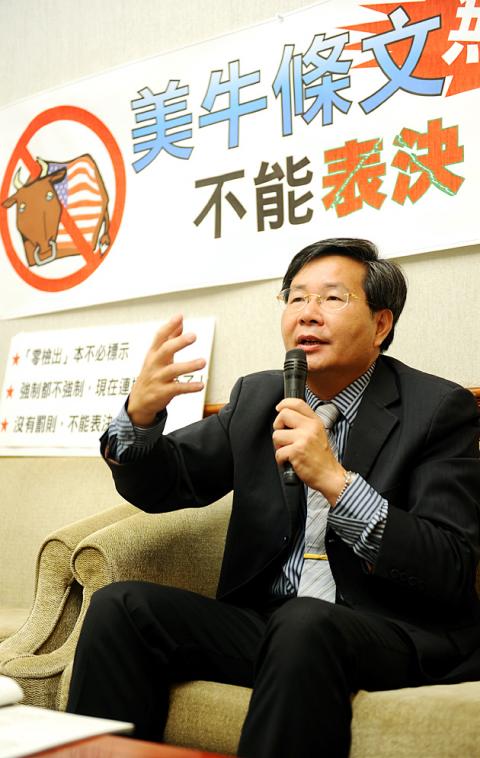|
Groups propose delay on relaxing
ractopamine ban
By Lee I-chia / Staff reporter

Taiwan Solidarity Union caucus
whip Hsu Chun-hsin protests putting the US beef amendment to a vote at a press
conference yesterday.
Photo: Chang Chia-ming, Taipei Times
Holding a “Safety evaluation of
racatopamine” report by the European Food Safety Authority (EFSA) from 2009 as
evidence of uncertain health risks associated with the livestock feed additive,
civic groups and lawmakers yesterday urged the government to halt a legislative
vote today on a proposal to lift the ban on racatopamine residue in meat
products.
Showing a video clip of inhumane cattle raising in feedlots in the US at a press
conference, the Environment and Animal Society of Taiwan (EAST) urged the
government to wait for the Codex Alimentarius Commission’s conclusion on
ractopamine’s maximum residue limit (MRL) next month, instead of hastening to
pass an amendment that it said would cause suffering to people and animals.
The commission — the international food standards body established by the UN
Food and Agriculture Organization (FAO) and the WHO — has scheduled meetings for
next month to decide whether a MRL for ractopamine should be adopted.
Hsu Li-min (許立民), a doctor at National Taiwan University Hospital who attended
the Council of Agriculture’s third technical advisory committee meeting on
ractopamine residues in March, said the conclusion of the EFSA’s report clearly
stated that there are uncertainties on setting a “no observable effect” level
for ractopamine intake.
The report also said that US experiments on the safety of ractopamine were
focused on acute and transient effects of ractopamine intake, which lacked an
evaluation value of its long-term effects, Hsu said.
It further stated that the long-term effects on people with cardiovascular
disease, diabetes, liver or kidney disease, as well as children under 18 months
remained unknown, he said.
Moreover, the report stated that a pivotal human study based on only six test
subjects was questionable due to a biased experiment design, Hsu said.
“The human study cannot be taken as a basis to derive an acceptable daily
intake, as proposed by JECFA [Joint FAO/WHO Expert Committee on Food Additives],
and consequently no proposal for MRLs can be made,” Hsu quoted the report as
saying.
Homemakers United Foundation president Chen Man-li (陳曼麗) said she told President
Ma Ying-jeou (馬英九) that he had been blinded when Ma called her on Wednesday last
week asking why the groups were still concerned about the safety of US beef when
the technical advisory committee meeting had already reached a consensus of no
clear evidence of negative health effects.
Chen said she had listened to the discussions during the whole meeting and the
committee did not reach such a conclusion that day.
In addition, Chen said she was surprised to hear Ma say that beef with
ractopamine residue had already been imported into Taiwan in the past three to
four years, even though the ban on the substance has not been lifted.
|
![]()
![]()
![]()